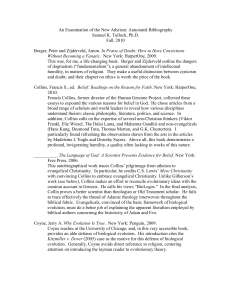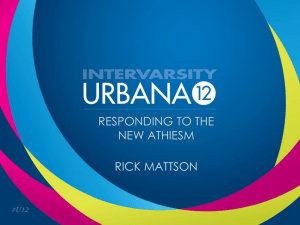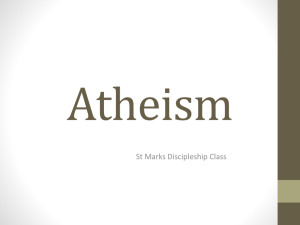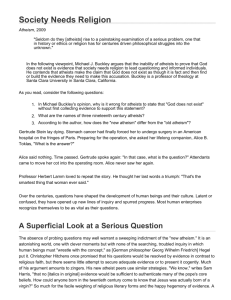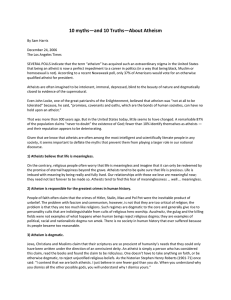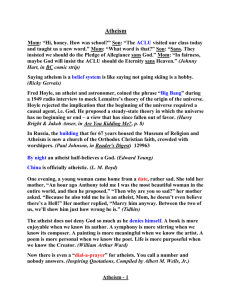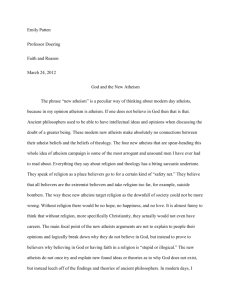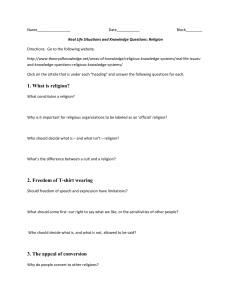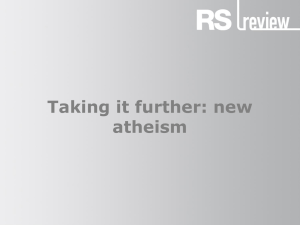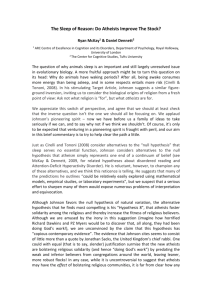what`s new about the new atheism
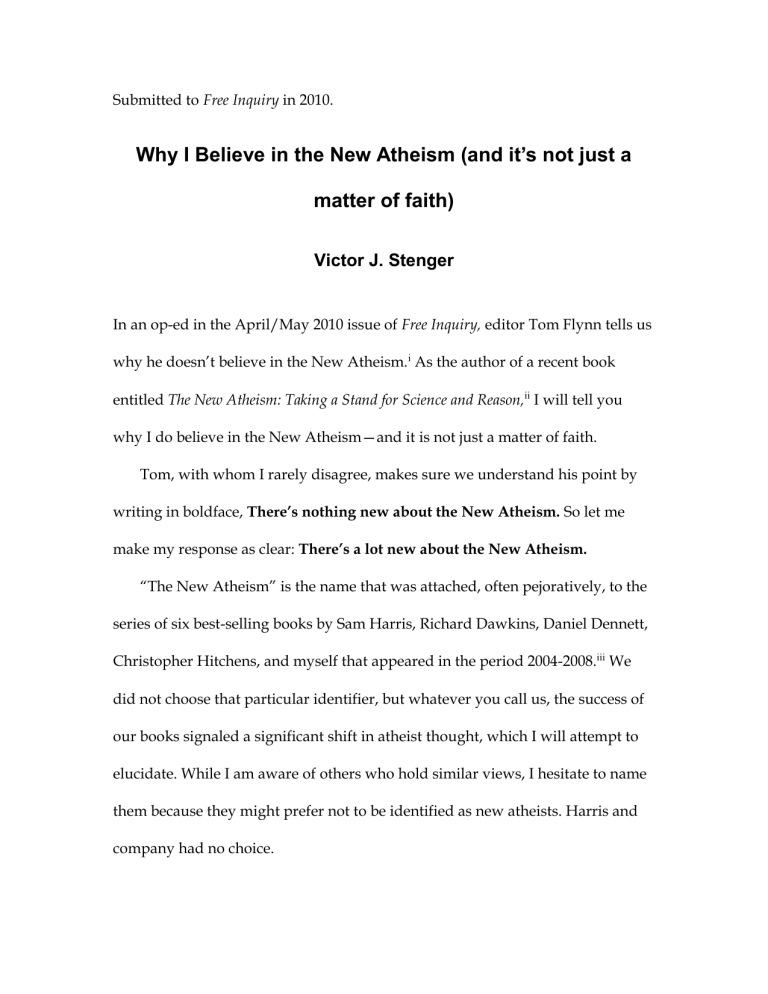
Submitted to Free Inquiry in 2010.
Why I Believe in the New Atheism (and it’s not just a matter of faith)
Victor J. Stenger
In an op-ed in the April/May 2010 issue of Free Inquiry, editor Tom Flynn tells us why he doesn’t believe in the New Atheism.
i As the author of a recent book entitled The New Atheism: Taking a Stand for Science and Reason, ii I will tell you why I do believe in the New Atheism—and it is not just a matter of faith.
Tom, with whom I rarely disagree, makes sure we understand his point by writing in boldface, There’s nothing new about the New Atheism. So let me make my response as clear: There’s a lot new about the New Atheism.
“The New Atheism” is the name that was attached, often pejoratively, to the series of six best-selling books by Sam Harris, Richard Dawkins, Daniel Dennett,
Christopher Hitchens, and myself that appeared in the period 2004-2008.
iii We did not choose that particular identifier, but whatever you call us, the success of our books signaled a significant shift in atheist thought, which I will attempt to elucidate. While I am aware of others who hold similar views, I hesitate to name them because they might prefer not to be identified as new atheists. Harris and company had no choice.
2
The new atheists are well aware of the history of freethinking. We stand on the shoulders of giants such as Robert Ingersoll and Bertrand Russell. We are also aware that several of our views are not popular among many long-time atheists who have not hesitated to speak out against them. Indeed, after the bestsellers appeared the authors found themselves under public attack not only by a host of Christian apologists but by prominent atheists as well. This alone refutes Tom’s contention that there is nothing new in New Atheism.
New atheism is distinguishable from a segment of old atheism that I will refer to as “accommodationism.” Again I will not name names so that individuals can choose whatever camp they want, or neither.
The accommodationists are those atheists and freethinkers who have taken the well-meaning position that, as a strategy, atheists should assume a soft stance toward those members of more moderate religious sects. They are careful not to offend what are always referred to as “deeply held beliefs,” no matter how much those beliefs contradict any serious application of rational thought. One purpose of this kid-gloves approach is to assure the cooperation of moderate believers in the support of science, in particular, the teaching of evolution. The new atheists do not reject this goal, but also see the need for more serious confrontation with religion in today’s America.
Important examples of accommodationism are provided by the National
Academy of Sciences and several other professional scientific societies who have
3 issued statements to the effect that no contradictions exist between science and religion and, in particular, that evolution and Christianity are compatible.
A 1998 survey of National Academy members indicated that only 7 percent believe in a personal God.
iv Surely such a high level of unbelief has something to do with the members being scientists. I doubt you would find such low belief in the U.S. among associations of bakers or accountants. Yet, the Academy insists that science has nothing to say about God or the supernatural:
Science is a way of knowing about the natural world. It is limited to explaining the natural world through natural causes. Science can say nothing about the supernatural. Whether God exists or not is a question about which science is neutral.
v
This disingenuous statement is belied by the facts. Scientists from top-rated institutions such as Harvard, Duke, and the Mayo Clinic have performed careful experiments on the efficacy of prayer on healing.
vi These certainly had bearing on the existence of God. The results so far have been negative, but they need not have been. Many theologians and churchmen have adopted positions similar to the Academy. Imagine how fast they would change their tune if the evidence that prayer worked was positive and no natural explanation could be found.
They would gleefully fill the airwaves with, “See? We told you so. Science proves that God exists!”
Now, the new atheists have no problem cooperating with moderate theists on matters of science education or public policy. Our argument with them is over
4 ideas, not behavior, and there is no reason for them to be offended by intellectual discourse. If religion were confined to the home and church, and did not have such an adverse effect on society, we would have no legitimate complaint.
In The God Delusion Richard Dawkins refers to a statement by philosopher
Michael Ruse in an article in Playboy in which he likens the battle against creationism to World War II in which America and Britain joined with Stalin in defeating Hitler. Dawkins says he sees the superficial appeal of this strategy, but he finally comes down on the side of geneticist Jerry Coyne, who writes that the conflict is not just about evolution versus creationism. According to Coyne, “the
real war is between rationalism and superstition.” vii The new atheists see no reason to tone down their criticism of the irrational thinking associated with religion, or to keep their own non-belief in the closet. Currently we are experiencing a surge in the numbers of those who do not hesitate (as I myself did in the past) to call themselves atheists. The battle to teach proper science in the schools is important , but we think the more important battle is for rational thinking, from which good teaching will follow.
In the new atheist view, even the beliefs of moderate Christians contribute to what Susan Jacoby has identified as “The Age of American Unreason” in her best seller by that name.
viii While she identifies biblical literalism as a major contributor to the unreason she sees throughout the nation, Jacoby gives moderate faith a clean bill of health saying that it “attempts to accommodate
5 itself to secular education and secular government.” ix This is to be contrasted with the view of new atheist Sam Harris, who hits hard at religious moderation:
Religious moderation appears to be nothing more than an unwillingness to fully submit to God’s law. By failing to live by the letter of the texts, while tolerating the irrationality of those who do, religious moderates betray faith and reason equally.
x
At the same time, moderate believers and accommodationist atheists are not our main targets, which remain religious extremists and all forms of superstition. They speak out against us far more than we speak out against them.
Tom Flynn showed that he and Free Inquiry put free speech ahead of appeasement when they reprinted four of the controversial Danish cartoons of Muhammad in 2005, while the rest of the U.S. media were intimidated by the threat of violent reactions from Muslim militants.
Where were the accommodationists when this was happening?
So what is new in New Atheism besides generally taking a harder line against religion? We still subscribe to the principles expressed in the Humanist
Manifesto. However, we have something new to say about a few specific issues.
Let me summarize what I regard as the primary tenets of New Atheism that go beyond the Humanist principles that most atheists accept. While not necessarily original in every respect, or universally agreed on by all new atheists, these form
6 a body of additional standards that is not found in the recent teachings of the leaders of freethought.
1. Faith is foolish and should not be treated with respect. In America people of faith are treated with great deference by the community at large. Even worse, people without faith are regarded with deep suspicion and even enmity. There's an irrational "belief in belief" that goes beyond any religion.
Faith is belief in the absence of any evidence or reason. How can such a frame of mind be expected to lead to any special insight? We look back with disgust at the faith-based decisions of the George W. Bush administration that brought so much harm to America and the world and vow not to let the doctrine of stupidity rules happen again.
2. The Judeo-Christian-Islamic God can be treated as a scientific hypothesis
that can be tested against observations. The Abrahamic God plays such an important role in the universe that his presence should have been confirmed by now by the observation of his actions in the world. That no such actions have been verified is evidence beyond a reasonable doubt that such a god does not exist. This is still consistent with a deist god who does not act in the universe.
3. Evolution and Christianity are incompatible. Despite the claim by the
Catholic Church and moderate Protestants that there is no disagreement between
Christianity and evolution, a look at what they actually say they believe contradicts this.
xi A basic precept of Christianity is that God created the universe with a special place for humanity. Those who accept evolution say that this is
7 simply the way God chose to create humans, implying he stepped in along the way to make sure humanity evolved. This is supernatural selection, intelligent design—not Darwinian natural selection.
4. Irrational beliefs and reliance on authority have been a major source of
malevolence in the world. While religion is not the primary cause of violent conflict, it always seems to play a role. Additionally, religions suppress knowledge, oppress women, and add to the overpopulation problem by prohibiting abortion and contraception. By observing countries where religion no longer dominates, we conclude that society would be better off without religion.
The Catholic Church supports the teaching of evolution, but that hardly justifies secularists sitting back and not insisting that civic authorities take action and start arresting those priests who rape children and those bishops who cover up these crimes. New atheists Dawkins and Hitchens are leading the way in seeking legal action against the Pope.
5. Religion offers false comforts that people would be better off without. While religion may offer comforts to some, others live their lives in guilt for the sins they have committed, worrying how God will punish them either in the afterlife or in this life. Belief in an afterlife gives individuals a false impression of their own importance and contributes to the extreme self-centeredness that exists in the U.S. You may not live your life to the fullest if you do not realize that it is the only life you have. You will allow yourself to be dominated by snake-oil salesmen in robes.
8
6. If you rely on the Bible as a source of morality you will support many
wicked behaviors. Examples include beating your wife and children, preventing women from controlling their own bodies, and inhibiting research, such as with stem cells, that can save lives.
Old atheists tell us that we can be good without God. New atheists tell us that we can be even better without God.
While America remains a nation of believers, their profile is rapidly changing. Young people, especially, are moving away from organized religion in large numbers. Proudly identified atheist groups are growing rapidly, especially on college campuses. Almost all the members of these groups lean more toward the activism promoted by the new atheism than the passivism of previous years, which they view as a failure.
The message of new atheism has been terribly misrepresented as being exclusively negative. For every negative we have an even greater positive.
Reason is a noble substitute for faith, proven by its success. Knowledge results from the arduous labor of science, not the effortless daydream of revelation.
Vic Stenger’s latest project is called The Fallacy of Fine-Tuning: How the Universe Is
Not Designed for Humanity. For more information visit his newly redesigned website is at http://www.colorado.edu/philosophy/vstenger/.
Notes
9 i Tom Flynn, “Why I Don’t Believe in the New Atheism,” Free Inquiry 30, no.
3(2010): 7, 43. ii Victor J. Stenger, The New Atheism: Taking a Stand for Science and Reason,
(Amherst, NY: Prometheus Books, 2009). iii Sam Harris, The End of Faith: Religion, Terror, and the Future of Reason (New
York: Norton, 2004); Letter to a Christian Nation (New York: Knopf, 2006);
Daniel C. Dennett, Breaking the Spell: Religion as a Natural Phenomenon
(New York: Viking, 2006); Richard Dawkins, The God Delusion (Boston:
Houghton Mifflin, 2008); Victor J. Stenger, God: The Failed Hypothesis—
How Science Shows That God Does Not Exist (Amherst, NY: Prometheus
Books, 2008); Christopher Hitchens, God Is Not Great: How Religion Poisons
Everything (New York: Twelve Books, 2007). iv Edward J. Larson, “Leading Scientists Still Reject God,” Nature 294, no.
6691(1998): 313. v National Academy of Sciences, Teaching about Evolution and the Nature of Science
(Washington, DC: National Academy of Sciences, 1998), p. 58. Online at http://www.nap.edu/catalog/5787.html (accessed March 5, 2006). vi H. Benson, J. A. Dusek, J. B. Sherwood, P. Lam, C.F. Bethea, et al., ”Study of the
Therapeutic Effects of Intercessory Prayer (STEP) in cardiac bypass patients:
A multicenter randomized trial of uncertainty and certainty of receiving intercessory prayer.” American Heart Journal 151(4): 934-42.
10 vii Dawkins, The God Delusion, p. 67. Coyne’s comments appeared in the August,
2006 issue of Playboy. viii Susan Jacoby, The Age of American Unreason, (New York: Pantheon Books,
2008). ix Ibid, p. 207. x Harris, The End of Faith, p. 21. xi Pope John Paul II, “Magisterium is Concerned With Question of Evolution for it Involves Conception of Man,” http://www.cin.org/jp2evolu.html
(accessed July 12, 2009).

